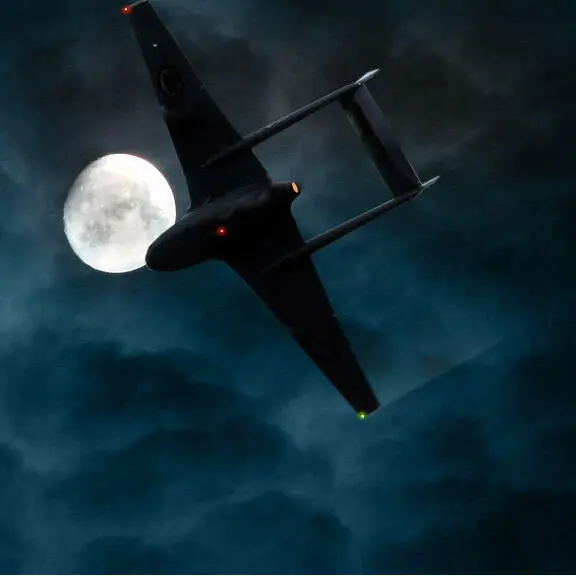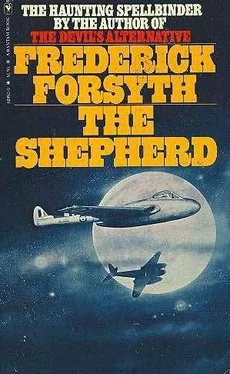Frederick Forsyth - The Shepherd
Здесь есть возможность читать онлайн «Frederick Forsyth - The Shepherd» весь текст электронной книги совершенно бесплатно (целиком полную версию без сокращений). В некоторых случаях можно слушать аудио, скачать через торрент в формате fb2 и присутствует краткое содержание. Город: London, Год выпуска: 1975, ISBN: 1975, Жанр: Триллер, prose_military, на английском языке. Описание произведения, (предисловие) а так же отзывы посетителей доступны на портале библиотеки ЛибКат.
- Название:The Shepherd
- Автор:
- Жанр:
- Год:1975
- Город:London
- ISBN:0-4718-106-9516-1
- Рейтинг книги:5 / 5. Голосов: 1
-
Избранное:Добавить в избранное
- Отзывы:
-
Ваша оценка:
- 100
- 1
- 2
- 3
- 4
- 5
The Shepherd: краткое содержание, описание и аннотация
Предлагаем к чтению аннотацию, описание, краткое содержание или предисловие (зависит от того, что написал сам автор книги «The Shepherd»). Если вы не нашли необходимую информацию о книге — напишите в комментариях, мы постараемся отыскать её.
The Shepherd — читать онлайн бесплатно полную книгу (весь текст) целиком
Ниже представлен текст книги, разбитый по страницам. Система сохранения места последней прочитанной страницы, позволяет с удобством читать онлайн бесплатно книгу «The Shepherd», без необходимости каждый раз заново искать на чём Вы остановились. Поставьте закладку, и сможете в любой момент перейти на страницу, на которой закончили чтение.
Интервал:
Закладка:
Before trying Lakenheath, it would be correct procedure to inform Channel D, to whom I was tuned, of my little problem, so they could advise Lakenheath I was on my way without a compass. I pressed the transmit button and called.
“Celle Charlie Delta, Celle Charlie Delta, calling North Beveland Control…”
I stopped. There was no point in going on. Instead of the lively crackle of static and the sharp sound of my own voice coming back into my own ears, there was a muffled murmur inside my oxygen mask. My own voice speaking… and going nowhere. I tried again. Same result. Far back across the wastes of the black and bitter North Sea, in the warm cheery concrete complex of North Beveland Control, men sat back from their control panel, chatting and sipping their steaming coffee and cocoa. And they could not hear me. The radio was dead.
Fighting down the rising sense of panic that can kill a pilot faster than anything else, I swallowed and slowly counted to ten. Then I switched to Channel F and tried to raise Lakenheath, ahead of me amid the Suffolk countryside, lying in its forest of pine trees south of Thetford, beautifully equipped with its GCA system for bringing home lost aircraft. On Channel F the radio was as dead as ever. My own muttering into the oxygen mask was smothered by the surrounding rubber. The steady whistle of my own jet engine behind me was my only answer.

It’s a very lonely place, the sky, even more so the sky on a winter’s night. And a single-seater jet fighter is a lonely home, a tiny steel box held aloft on stubby wings, hurled through the freezing emptiness by a blazing tube throwing out the strength of six thousand horses every second that it burns. But the loneliness is offset, canceled out, by the knowledge that at the touch of a button on the throttle the pilot can talk to other human beings, people who care about him, men and women who staff a network of stations across the world; just one touch of that button, the transmit button, and scores of them in control towers across the land that are tuned to his channel can hear him call for help. When the pilot transmits, on every one of those screens a line of light streaks from the centre of the screen to the outside rim, which is marked with figures, from One to Three Hundred and Sixty the number of degrees in a complete compass. Where the streak of light hits the ring, that is where the aircraft lies in relation to the control tower listening to him. The control towers are linked, so with two cross-bearings they can locate his position to a few hundred yards. He is not lost any more. People begin working to bring him down.
The radar operators pick up the little dot he makes on their screen from all the other dots; they call him up and give him instructions. Begin your descent now, Charlie Delta. We have you now…. Warm, experienced voices, voices who control an array of electronic devices that can reach out across the winter sky, through the ice and rain, above the snow and cloud, to pluck the lost one from his deadly infinity and bring him down to the flare-lit runway that means home and life itself.
When the pilot transmits. But for that he must have a radio. Before I had finished testing Channel J the international emergency channel, and obtained the same negative result, I knew my ten-channel radio set was as dead as the Dodo.
It had taken the R.A.F two years to train me to fly their fighters for them, and most of that time had been- training precisely in emergency procedures. The important thing, they used to say in flying school, is not to know how to fly in perfect conditions; it is to fly through an emergency and stay alive. Now the training was beginning to take effect.
While I was vainly testing my radio channels, the eyes scanned the instrument panel in front of me. The instruments told their own message. It was no coincidence the compass and the radio had failed together; both worked off the aircraft’s electrical circuits. Somewhere beneath my feet, amid the miles of brightly coloured wiring that make up the circuits, there had been a main fuse blow-out. I reminded myself, idiotically, to forgive the instrument fitter and blame the electrician. Then I took stock of the nature of my disaster.
The first thing to do in such a case, I remembered old Flight Sergeant Norris telling us, is to reduce throttle setting from cruise speed to a slower setting, to give maximum flight endurance.
“We don’t want to waste valuable fuel, do we, gentlemen? We might need it later. So we reduce the power setting from 10,000 revolutions per minute to 7200. That way we will fly a little slower, but we will stay in the air rather longer, won’t we, gentlemen?” He always referred to us all being in the same emergency at the same time, did Sergeant Norris. I eased the throttle back and watched the rev-counter. But it too was an electrical instrument, and I had lost the lot when the fuse went. I judged by engine note when the Goblin was turning over at about 7200 rpm, and felt the aircraft slow down. The nose dropped fractionally, so I adjusted the flight-trim to keep her straight and level.
The main instruments in front of a pilot’s eyes are six, including the compass. The other five are the airspeed indicator, the altimeter, the bank indicator (which tells him if he’s banking, i.e. turning, to left or right), the slip indicator (which tells him if he’s skidding crabwise across the sky) and the vertical speed indicator (which tells him if he’s diving or climbing and if so how fast). The last three of these are electrically operated, and they had gone the same way as my compass. That left me with the two pressure-operated instruments, airspeed indicator and altimeter. In other words, I knew how fast I was going and how high I was.
It is perfectly possible to land an aircraft with only these two instruments, judging the rest by those old navigational aids, the human eyes. Possible, that is, in conditions of brilliant weather, by daylight and with no cloud in the sky. It is possible, just possible though not advisable, to try and navigate a fast-moving jet by pilotage, using the eyes, looking down and identifying the curve of the coast where it makes an easily recognizable pattern, spotting a strange-shaped reservoir, the glint of a river that the map strapped to the thigh says can only be the Ouse, or the Trent, or the Thames. From lower down it is possible to differentiate Norwich Cathedral tower from Lincoln Cathedral tower, if you know the countryside intimately. By night it is not possible.
The only things that show up at night, even a bright moonlit night, are the lights. These have patterns when seen from the sky. Manchester looks different from Birmingham; Southampton can be recognized from the shape of its massive harbour and the Solent, cut out in black (the sea shows up black) against the carpet of the city’s lights. I knew Norwich very well, and if I could identify the great curving bulge of the Norfolk coastline from Lowestoft, round through Yarmouth to Cromer, I could find Norwich, the only major sprawl of lights set twenty miles inland from all points on the coast. Five miles north of Norwich I knew was the fighter airfield of Merriam Saint George, whose red indicator beacon would be blipping out its Morse identification signal into the night. There, if they only had the sense to switch on the airfield lights when they heard me screaming at low level up and down the airfield, I could land safely.
I began to let the Vampire down slowly towards the oncoming coast, my mind feverishly working out how far behind schedule I was through the reduced speed. My watch told me forty-three minutes airborne. The coast of Norfolk had to be somewhere ahead of my nose, six miles below. I glanced up at the full moon, like a searchlight in the glittering sky, and thanked her for her presence.
Читать дальшеИнтервал:
Закладка:
Похожие книги на «The Shepherd»
Представляем Вашему вниманию похожие книги на «The Shepherd» списком для выбора. Мы отобрали схожую по названию и смыслу литературу в надежде предоставить читателям больше вариантов отыскать новые, интересные, ещё непрочитанные произведения.
Обсуждение, отзывы о книге «The Shepherd» и просто собственные мнения читателей. Оставьте ваши комментарии, напишите, что Вы думаете о произведении, его смысле или главных героях. Укажите что конкретно понравилось, а что нет, и почему Вы так считаете.










